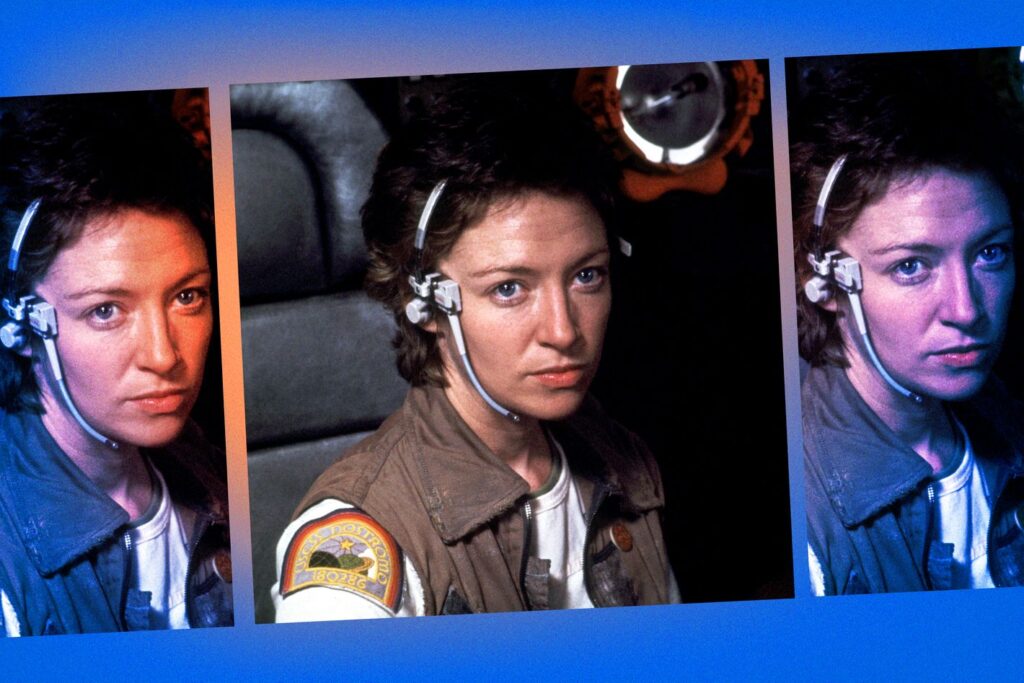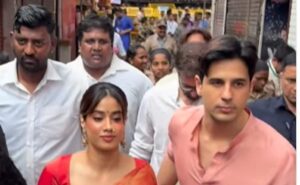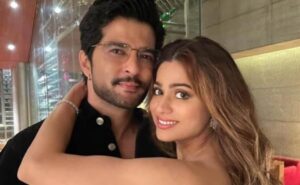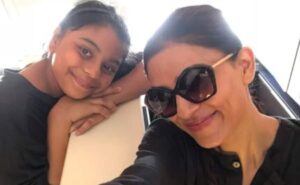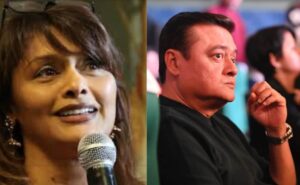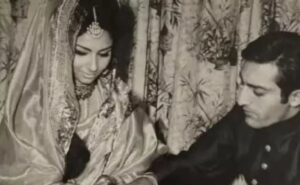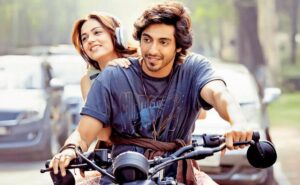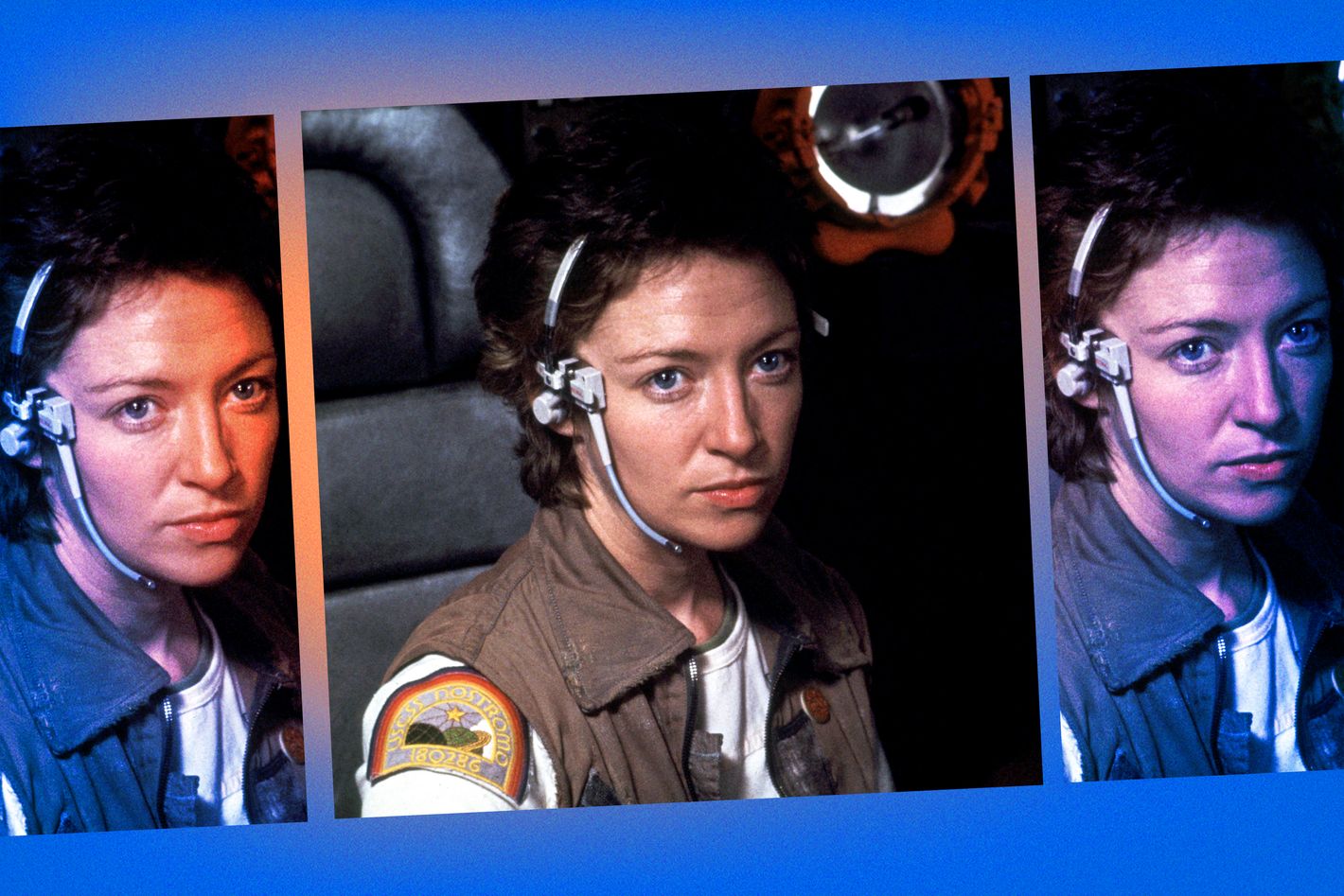
Shooting Alien was kind of like skipping boot camp and going straight to combat: No one was prepared for the grueling conditions under which Ridley Scott’s ambitious project would be filmed. Early in the production, the bulky space suits and intense summer heat had actors passing out mid-take. Later, Scott started ratcheting up tension among the cast to intensify certain scenes, like when one character had to slap another. Props malfunctioned, the set grew claustrophobic, and the cast was sometimes left waiting around idly while Scott and cinematographer Derek Vanlint obsessed over lighting details. At one point, the crew went on a brief strike to protest the long working hours. Worst of all, Veronica Cartwright had to chop off most of her long, beautiful hair.
The English-born actress had made The Birds and Invasion of the Body Snatchers by the time she showed up outside of London to shoot what would become one of the 20th century’s defining horror movies. Alongside Sigourney Weaver, Tom Skerritt, Harry Dean Stanton, John Hurt, Yaphet Kotto, and Ian Holm, she weathered a sweaty, technically arduous production that lasted nearly five months. If Cartwright was in the trenches, at least she was there with co-workers she enjoyed. Her character, the increasingly panicked Nostromo navigator Joan Lambert, can’t claim the same renown that Weaver’s heroic Ellen Ripley inspired, but Lambert maintains an unimpeachable place in the genre canon nonetheless.
The thing is, Cartwright almost was Ripley. That’s who she auditioned to play. But when the costume department summoned her for a fitting, they informed her that, actually, she’d been cast as Lambert. So she went from portraying the movie’s gutsy sole survivor to its jitteriest underling. Wanting to make Lambert more than some blubbering wreck, Cartwright emphasized her common sense. Early in the movie, when the Nostromo crew lands on the creepy planetoid that houses their doom, she’s the first person to say, “Let’s get the hell out of here.” Given her conviction, you wonder why no one listened to her.
Noah Hawley’s new FX prequel series Alien: Earth, set two years before the events of the original 1979 film, supplied a good excuse to collect Cartwright’s Alien memories. Ahead of the show’s debut, we gave her a ring, right as the 76-year-old actress was returning home from Pilates.
I want to hear your very first memory of Alien.
My agent sent me on an interview at 20th Century Fox. I auditioned for Ripley. Then I was going to go over to England to visit my gran, who was still living in Bristol. I said to my agent, “If that part hasn’t gone yet, can I see if I can meet them over there?” So I interviewed again over in England. Of course, nobody tells you anything, and then I got a call that I got it. That was really cool. My boyfriend at the time was working for Jack Nicholson. He was a chef. His parents had a little place in Elephant and Castle. And the wardrobe people called me and said, “We’d like to set up a time for wardrobes for Lambert.”
Uh-oh.
I said, “Oh, no, I’m Ripley.” They said, “No, you’re Lambert.” I said, “Well, I’m gonna have to call my agent on this.” I called America and I said, “Aren’t I playing Ripley?” My agent said yes, and I said, “Well, according to them, I’ve got the part of Lambert.” I thought, Well, this is ridiculous. I hadn’t even read the script from that point of view. She was such a weepy person. I called the producers and said, “You’re going to have to let me read it and see if I like it or not.” I read it that night and thought, Well, what can I do with this?
What else did you see in her when you read it again?
She is the only one who keeps saying, “All right, let’s get off this ship. Let’s do something.” She does have some balls, but everybody doesn’t listen to her. I guess the movie would have ended much sooner. I said, “Well, okay, but I don’t want to make her this weepy little sad thing.”
On my first day, we shot in the engine room. We were landing the ship, and Ridley loves smoke. It was beeswax in those days. It’s thick and it’s heavy and it sticks to you, and we were working with an actor named Jon Finch. He was playing the part that John Hurt eventually got. He had just gotten out of the hospital with pneumonia and went back into the hospital after his first day of shooting because he couldn’t breathe. The next day, we reshoot it with John Hurt. John comes in, and I look at him and I think, My God, we look like clones of each other. All of my hair was cut off. Before that, my hair was long from Invasion of the Body Snatchers.
Yes, I was going to ask whether that short hairstyle was your choice.
No, honey, it was not my choice. They took six hours to cut it. They kept taking off stuff, and finally Ridley said, “I want it to look like this.” Of course, it was the punk generation, and I said, “You know what, we can do that with gel.” I went to a hairdresser and said, “Just even this out. I have to live. We can stick it up with gel.” It looked great for the part. We’re supposed to be truckers in space, and it was utilitarian. But I looked just like John Hurt. Our skin was the same complexion, and we both had freckles. It worked for the movie. John is such a wonderful actor and a lovely person, and we never heard anything about Jon Finch ever again.
Poor thing. I’m sure he regretted not being part of it. My impression is that Lambert was more wise-cracking in one of the earlier scripts. And then over time, she became more serious — weepy, as you describe her. Is that what you remember, or had she already evolved by the time you read the script from Lambert’s perspective?
By that point, it already evolved. I always got the impression that Yaphet Kotto’s character, Parker, and Lambert had gotten together.
I was going to ask you that exact question.
Yes. I adore Yaphet, and he’s such a sweetheart. When we did the scene around the breakfast table, somebody says something about wanting to eat, and Parker says, “Well, I know what I’d like for breakfast,” and everybody winces but me. I always figured they had a flirty thing going.
He also tries to protect her in that final moment when the two characters are dying.
Yeah, he does. And the other day I did a convention and somebody said, “Did you know that your character was trans?” I said, “Oh, I was not trans when I did that movie.” That was James Cameron’s thing when he did the sequel eight years later and they talk about the characters from the original. I didn’t play it any different than I would have, though. But that was his version of Lambert.
I do wonder about the bait and switch with your casting. You think you’re playing one character, and then all of a sudden you aren’t. What impact, if any, do you think that had on the way you approached the project, especially knowing how famous Ripley has since become?
Well, you know, we never shot my death. My death was supposed to be crawling up inside of the locker that the cat used to go in. The alien was supposed to pull me down. I kept saying, “When are we shooting my ending?” About two weeks later, I’m called in, and I’m put into a harness and hanging from a hook up in the sky with my legs dangling.
Someone once asked, “How do you feel about the tail going under your legs?” Well, actually, that’s Harry Dean Stanton’s legs. All of a sudden they made his pants whiter, because I always wore white pants and he wore blue, and he always wore tennis shoes and I wore cowboy boots. I said, “Just watch the movie. The tail goes under Harry Dean, who’s wearing sneakers.” But I guess it’s so fast that nobody really caught that. I caught it, and I was pissed off.
Pissed off why?
Well, because someone asks how that felt, and I have to say, “I don’t know, ask Harry Dean.” We never had a premiere, we never had anything. The first time I saw it, I went down to the Egyptian Theatre. They changed the character so much, so in that sense I was a bit irritated about the whole thing. There were weird things that happened on that set. It was a great group of people, but it was very difficult — long hours.
I’d never been on a set before when an entire crew went on strike. It was very difficult. We were out at Shepperton Studios, which was a good hour from London, and a lot of these people were housed further than that. When we wrap, they still have to put all the cords away and wrap up all the equipment and drive two hours to get home. So they gave a warning. They said, “Next Friday, we’re going to pull the plug at 5:30 because we need to have a weekend, and we haven’t had one.” We were shooting for like five months. At 5:30 that night, they waited until the scene finished, and then, “All right, boys,” and boom — the lights were unplugged. Of course the producers came down, and the crew said, “We told you about this. We have not had a weekend.” The producers said, “Well, Ridley is willing to work.” Ridley is always willing to work. He’d work around the clock if he could. But they went and had their weekend. I love the British crews. They’re just great.
And then everything resumed as normal after the weekend?
Yeah. But it’s difficult. They were great people, and so professional.
Ridley Scott has suggested that he wasn’t asked to make the sequel because he was tough to work with. I think he was referring mostly to executives at the studio, but did you and the cast find him difficult to work with?
Well, he’s more interested in what things look like. He was a set designer. Basically, you come in and do your lines, and that was what was expected of you.
When I come off the ship and John’s got the facehugger on him and Ripley’s not letting us out of the locker, Ash lets us in. Then we have an argument and I slap her across the face. That was cut out of the first cut, but it’s in the director’s cut. Every time I went to slap her, she would duck. So my direction from Ridley was, “Just fucking get her this time.” I thought, Well, okay. I went to slap her, she ducked, and I backhanded her, and oh my God. She was not a happy camper. Her tears welled up, but we finished the scene and Ridley was very happy with it. But I had to do that. Those were our directions. Or Yaphet would sometimes improv, but Ridley likes that. He would tell Ripley certain things to piss her off when she says she’s the captain of the ship. His directions were things like that: “Just piss her off.”
I imagine that doesn’t always create the most harmonious working environment.
No. But we all knew what he was talking about. We were a great group of people. When it got later and later in the production, the air conditioning was going out, and they had big pump sprays of glycerin and they’d pump it on you so you’d look like you were sweating. It was so disgusting. Every particle of dirt would just glue itself to your body. But when I came back to America, I had that crew cut, and I couldn’t get a job to save my life. When Liza Minnelli cut her hair off, everybody thought, Oh, that’s so cool. I was wearing ties way before she was wearing ties because I used to dress in antique clothing. One casting agent called my agent and said, “Doesn’t she have any new clothes?” That’s just how I dressed. Today, they’ll just stick a wig on you, for God’s sake. Look at Cynthia Erivo. She’s bald, and they stick hair on her all the time.
The tough working conditions were manifold. You’re in the summer heat, actors are passing out —
The bottles were popping in the bars. We had these 50-pound football things on and helmets that didn’t have any air holes, and CO2 was floating down the inside. All three of us passed out at one point. By the time we carried John Hurt across that desert and went up to the top of that lift, I was weaving around. Tom Skerritt was yelling, “Help, help,” but nobody could hear us because they’d forgotten to put any mics in there. It was hard work.
When you weren’t shooting, did everyone hang out, or did you need time to decompress?
There’s a great picture with me and Tom sitting there with our helmets off, and I’m smoking a cigarette and he’s got a cup of coffee. We couldn’t get off the set. Once you had that uniform on, it was just too difficult to take off. They had lined it with nylon. I think I lost ten pounds by the end of that week. It was like pools of sweat when you took your stuff off. And Balaji in that rubber suit, my God. Tom said to the prop department, “You need to make him a swing or something.” They made him a big swing so that he could sit down with the tail. He was terrific. He didn’t have to do anything — I just looked at him and I was scared to death. At one point, they had tons of red, white, and blue maggots, and they wanted to sit them on his head. He goes, “That’s where I draw the line.”
Fair enough.
But they kept putting slime all over him. We had a wonderful dresser. We called him Mother. He’d come running in, and I’ve never seen a tube of K-Y Jelly as big as that. He’s squirting it on him and caressing the ass. It was hysterical. There were light moments like that. Otherwise you’d go crazy.
We don’t need to spend a lot of time on the chestburster scene because it’s so well-documented, especially that fact that only a couple of you — John and Tom — knew the full extent of what would happen during that take. Today, the scene would probably be entirely CGI. What exactly were you looking at as John was writhing around on the table?
There was a fake chest that was filled with guts. The set stunk. I wretched as I walked in. There were four cameras to get everybody’s reaction, so we actually watched it come out. They cut the T-shirt, and there was a man under there with a puppet. But I did not know I was going to lean directly into a blood jet. I was so fascinated, and there was tension building up because he called cut so they could cut the T-shirt material a little more because it wasn’t open enough to push the little penis guy through. And then I was just right there. When the blood hit me in the face, I just naturally went, “Oh my God!” I backed up, my knees hit the banquette, and I flipped upside down. It was ridiculous. Then I realized they were still shooting, and I rolled over and ran back in.
And you didn’t do another take after that, right?
One take, yes.
Do you think it’s something you could have repeated? Everything you’re describing is so organic. You might never achieve the same dynamic twice.
I think that’s why there were four cameras. Your first reaction was the reaction they got. I think it was always intended to be a one-off.
You mentioned there wasn’t a premiere. Was there a wrap party?
I threw it.
Okay, go on.
Because my boyfriend was Jack Nicholson’s chef, we bought tamales and all this stuff and then he gussied it up. We went down to my house and made tons of margaritas. We had a whole bathtub out back with beers. The prop guys really liked me, and one of them said, “My brother’s a DJ.” He brought over a ball that sparkles, a whatchamacallit. I invited all my neighbors to come too, and people like Art Garfunkel showed up. It was insane. There were six bodies the next morning when I woke up and went downstairs. I don’t know if anybody found the bedrooms. Fantastic party.
Anyone else of note?
Alan Parker was invited, but Alan couldn’t come. The makeup department knew him from another movie. I went on an interview months after I got back for something that Alan was doing, and he goes, “Oh, you threw that big party! I’m so sorry I didn’t make it.” Everybody came — Ridley, the whole crew, Sigourney, Tom.
Then Alien was gigantically successful. What kind of opportunities did you get in its wake? It took a few years for you to show up in another film, which was The Right Stuff.
It takes a while to get a movie of that scale together. I did do some TV stuff, but I was in a really bad car accident. I had 35 breaks in my ankle, and I had a cast that was up to the top of my thigh. When Phil Kaufman requested to see me for The Right Stuff, my mom took me to Culver City and I had to walk up stairs, and I thought, What am I to do? He can’t see me limping. So I danced down the hall: “Hey, what’s happening!” I did the audition, and it worked out. I got the movie.
Is there a question about Alien that you feel you’ve never been asked? An anecdote you’ve never been prompted to share?
No, honey. I think I’ve been asked every question.
Fainting actors, a claustrophobic set, a rebelling crew, and a casting bait and switch. “I was pissed off,” remembers the actor who played Lambert.

